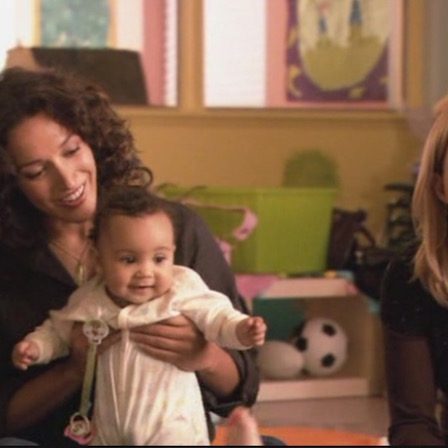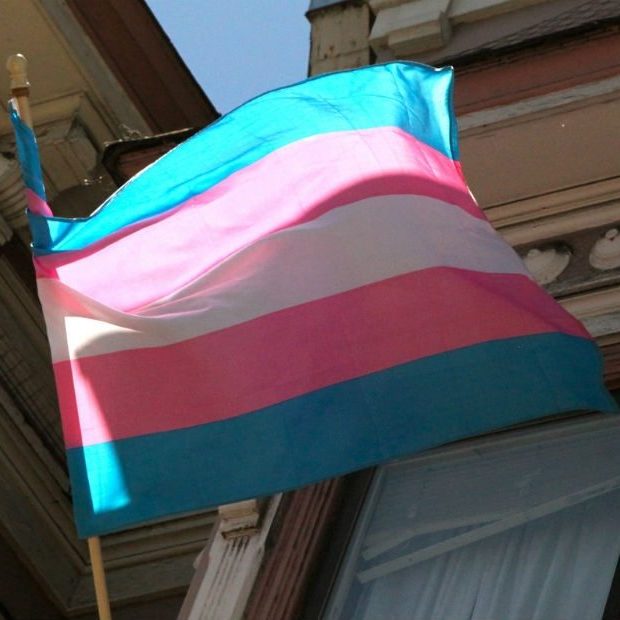Navigating the nuances of being the moms in a two-mom family!
For a long time I have believed that the story you tell is the one that everyone believes.
In the early Millennium years it was “OK” to be gay, but still quite hard for most young people to tell their family and friends.
Circa 2003, people I knew who were struggling with “coming out” found comfort in this concept: “People perceive you the way you present yourself.” So if you’re OK with being gay, usually they are too.
Here’s another example—both of our children were two years old when they began to notice their classmates had a “mom and a dad” family and ours did not.
At three, their cousins asked the same question. And by four, nearly all their friends and parents of friends wanted language to talk about our family.
That happened a lot earlier than I expected.
The night my eldest asked me “Where’s my Daddy?” having not previously been a parent of a two year old, I was surprised by the question because of both his age, and the phrasing.
I felt frustratingly uncomfortable. Yet the question was asked in earnest. It wasn’t laden with judgement.
He was a boy being raised by two rather mainstream moms, and for our part, we did not yet understand the importance of visibility. (At the time, I didn’t believe that we needed to pursue gay families: I felt like I’d be saying the wonderful heterosexual families in our lives were “less than,” and I wasn’t OK with that.)
So while he was wondering if “my Daddy” was a concept, my discomfort came from the judgement I brought to the phrasing. And I have to add, I’ve always liked the fact that I’m willing to re-examine the things I think I know. I’m glad I stopped to consider: Was I failing to offer something to my son because I was not a man?
You can probably blame the Catholic teaching I was subjected to, but children were expected to have two parents, made up of precisely one counterpart female and one part male. I let go of that when I chose to have children (Catholicism far sooner than that). But that night, betrayed by my emotions, I realized there was also something deeper I needed to explore. Growing up in the conditions I did, there was a kind of ‘out of wedlock’ or ‘divorce’ shame, or maybe a ‘widowed’ hush unspoken in not having a “daddy”. I didn’t want to continue to carry that old whispering around.
Even though it was even my own carefully created family, I was unpractised at how to simplify the concept of “difference” for my young one’s ears and mind – without screwing it up.
Socially, diversity is less comfortable—historically we kept each other safe by eating the same plants and staying away from dangerous areas. We expect and take comfort in everyone doing the same thing as us. But like a lot things that were historically true (e.g. only birds can sky travel)—when you realize what you’re spreading no longer fits the world you live in, you have to take action to make change.
There is a simple truth of why our children don’t and never will have “a Daddy” and I use it to answer my children and everyone else in our lives, and if you read this blog, you’ve read it before: “Your family was started by two women – so you have two moms.”
“Mummy came from a ‘mom and dad’ family,” we might say on a drive to their Grandparents.
“Singling Out” has traditionally been a way of correcting behaviour. We try to make sure that our family isn’t the only family named as “different” – all of those “mom and dad” families are different to ours. I want my children to be comfortable with other people’s differences as well as our own.
I realize you might think this sounds as if we are feeding our children some kind of language diet. But you know circular conversations and scripts are often how children learn abstract ideas. Our youngest just needs to say “nose on” and we know he wants us to talk about the “mean kids” who put the “muzzle” on the young fox in Zootopia. The sadness of the bullying in that scene haunts him. He says this about 4 times a day. (Yeah, maybe it was a bad call to show him that movie!)
But it turns out, a child as young as the littlest toddler needs to be taught language to help them comprehend a world that largely (still!) keeps more than 10% of the world’s population in the shadows – under the rug – in the closet: invisible.
We also look at what we are bringing in our homes. How many TV shows have homosexual families? How many cartoons have Mommy-Daddy families? How many books? And quantity does matter as much as quality in this regard. (I love you The Fosters but I want more. Blended families, multinational families – you feel me.)
Parent-free TV shows like Paw Patrol allow children to avoid feeling singled out. From as early as the age of 2, children are assessing themselves next to their classmates. From family life to the rest of their person this trend of comparison continues into adolescence – and it creates the self-conscious tweens and teens that are entirely loveable but sadly certainly don't often feel it.
Particularly, when the topic comes up we don’t avoid it nor Dorothy Boyd it: “No buddy, you don’t have a dad” (Sad face). We are not the Jerry Maguire mom who blames her failed relationships (or no-good partner) on ripping these kids off of the experience of feeling loved and worthwhile – and instead makes them abandoned. It’s not like that for us, we chose to have kids. With dedication we worked for more than 1.5 years to create each of them.
I’m not saying someone with influence won’t come into their lives at some point and contradict us: unfortunately, our kids might believe that person more and stop thinking our family structure is equal to anyone else’s.
For now, we are trying harder to give them examples of lots of families so they can make up their own minds when the time comes. We want to make sure that even if a family make up like ours is a little more ‘rarely seen’ in quantity–they have every reason to see it’s not “less than” in quality.

.jpg)

